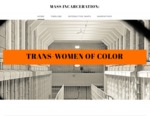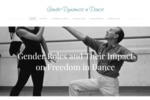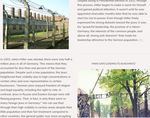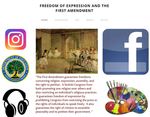GHS Student Projects
Butler University’s Global and Historical Studies Program introduced a new core course, GHS 210 Freedom and Movement in the Transatlantic World, in fall 2017. Developed with support from the National Endowment for the Humanities, this course poses the enduring question, “What is freedom?”. While the word “freedom” is often conventionally associated with free market capitalism and the movement of people across national borders, this course challenges and complicates that assumption by asking students to consider the relationship between freedom and movement in and across Africa, the Americas, and Europe between the fourteenth century and the present.
GHS 210 students discussed diverse artistic, historical, and philosophical works while concurrently developing digital humanities projects. Most students entered this second-year course without subject matter expertise but nevertheless created interesting, innovative, and ambitious projects. The students worked in small groups to explore various topics related to Freedom and Movement and to develop the technological skills necessary to present their topic in visually appealing and accessible ways. The gallery below highlights a few of these projects. You can find all of the projects on Digital Commons at Butler.
Mass Incarceration: Trans-Women of Color

This project brings attention to the injustices faced by transwomen of color in the United States’ prisons. Through a timeline, maps, and infographics, student authors Zoya Barker, Cataline Gallegos, Isaiah Moore, Elise Wang, and Mikayla Whittemore discuss how the personal freedoms of these women are taken away through “disproportionate imprisonment, prison assignments that go against the preferred gender, abuse within the Prison Industrial Complex, and many other cruelties.”
View Mass Incarceration: Trans-Women of Color
The F Word: Encouraging Civil Discourse

This student project, created by Julia Cerra, Josh Hall, Kasey Meeks, Sophia Shultz, and Ross Wilson for Dr. Garver’s GHS 210 section, explores the concept of freedom can be polarizing, and in the words of these young scholars, “before we can understand different perspectives and disagree respectfully, we must first understand how we learned our beliefs and how they shape and limit our conversations with others who think differently.” This project investigates whether members of the Butler community have thought about where their thoughts on freedom come from, and whether they’ve influenced their interactions with others.
View The F Word: Encouraging Civil Discourse
Gender Dynamics in Dance

According to student authors Gen Bolton, Alex Lindsey, Isabelle Ramey, and Rebecca Tchan, while gender equality in professional dance has improved in recent years, there remains a disconnect “between apparent shifts toward equality on the stage–in the public eye–the continuing corruption occurring behind the scenes.” This digital project examines the “deep roots of patriarchal dominance and gender inequality that still exist” within the world of professional ballet.
Stay Woke: Effects of the Criminal Justice System

The Justice System as a whole is one filled with unfairness, inequality, and restrictions. Each state is different and each state contributes something unique. Indiana, home to Hoosiers and the Indy500, reflects a system that is home to differences in education, healthcare, and social limitations compared to other states GHS 210 students Olivia Allen, Stevie Sedlacko, and Mariah Zollinger chose to explore what makes Indiana’s justice system different from that in other states.
View Stay Woke: Effects of the Criminal Justice System
Mass Incarceration Across the Globe

This project brings attention to the injustices of mass incarceration and explains how mass incarceration, as a form of legal punishment, strips away the freedoms of various demographics, races, and socioeconomic classes more than others. The project focuses on the issue within three specific nations, and as the creators write, “whether it be the economy, social unrest, or legal corruption, there are many other outside influences that can impact the way a society views imprisonment as justifiable.”
View Mass Incarceration Across the Globe
Slavery, Freedom, and Education

This student project attempts to deconstruct and reorient conventional conceptions of the relationship between slavery, education, and freedom by analyzing historical documents, such as slave narratives and laws pertaining to the education of slaves, engaging with contemporary criticism, and positioning this topic within the conceptual framework of GHS 210-01: Freedom and Movement in the Transatlantic World —that is, considering the relationship between the education of enslaved individuals, freedom, and mobility in the antebellum United States. Although education is often viewed as a means of gaining increased freedom and mobility, this project argues that in the antebellum United States both the refusal to educate slaves and the selective education of slaves were used as additional apparatuses of oppression.
View Slavery, Freedom, and Education
#BlackLivesMatter, Freedom, and Movement

#BlackLivesMatter is a hashtag that started the Black Lives Matter movement that spanned the world and called for the end to brutality towards black people at the hands of law enforcement. This hashtag is a prime example of how social media encourages freedom and the movement of ideas. By analyzing the origins of free speech, and social media as well as the Black Lives Matter movement, student authors Khayleia Foy, Adam Habel, Makiah Harper, and Chandler Swain examine the power that social media has on freedom and movement.
View #BlackLivesMatter, Freedom, and Movement
Mengele and the Holocaust

This student project explores “Dr. Josef Mengele and his role in the annihilation of freedom and movement during the Holocaust.” The students noted that the Holocaust’s impact on freedom was “clearly negative and heartbreaking, so we wanted to delve deeper into a specific aspect of the ‘unfreedom’ that the prisoners in Auschwitz experienced.” This digital humanities project provides background on the Holocaust and Josef Mengele’s cruel experiments, but it focuses on the stories of the survivors. The project contains biographical information and Story Maps for Isabella Leitner; Vera and Olga Kriegel; and Indiana’s own Eva Mozes Kor and her twin sister, Miriam.
View Mengele and the Holocaust
Evolution of Slavery

This website, by student authors Jade Jochem, Peter Reilly, Emma Schneir, and Gwen Spencer, seeks to connect historic forms of slavery (plantation slavery fueled through the transatlantic slave trade) with modern forms of slavery (sex trafficking) to show the change that has occurred in the suppression of certain individual’s liberties, and the legal responses to restrict those actions. Through first-hand accounts and by looking at the primary demographics of these slaves, their conditions, and how they were brought into slavery, people can better understand how one’s ability to move and be free is inhibited by slavery.
Freedom of Expression and the First Amendment

This website by student authors Brooke Kobren, Sarah Lewis, Audrey Lukacz, and Michela Semenza explores the freedoms of expression created in the First Amendment as they are interpreted or enacted in education, art, media, and music in the 21st century.

